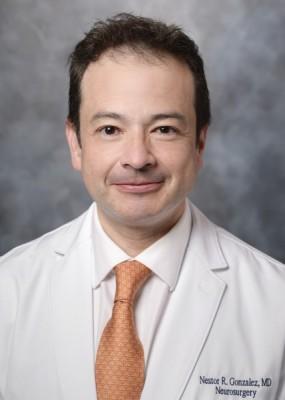Research from Cedars-Sinai leads to planning for a multicenter national study

Credit: Cedars-Sinai
HD Video Available for Download
LOS ANGELES — A surgical procedure advanced and studied by vascular neurosurgeons at Cedars-Sinai dramatically reduced the rate of recurrent strokes among patients with atherosclerotic disease, a new study shows.
Atherosclerotic disease, also known as hardening of the arteries, is a buildup of plaque that narrows the arteries leading to the brain. The condition is known to increase patients’ risk of having a series of strokes.
Exciting new results from a Phase II clinical trial conducted at Cedars-Sinai demonstrated that a new procedure reduced recurrent stroke rates from 37% to 10.7%. Encephaloduroarteriosynangiosis, or EDAS for short, is a new procedure that was used and recently published in the journal Neurosurgery.
“The EDAS procedure is unique in that it involves rerouting arteries from the scalp and membranes that cover the brain, to segments of the brain at risk of stroke,” said Nestor Gonzalez, MD, director of the Cedars-Sinai Neurovascular Laboratory. “Similar to gardening, over time, new blood vessels form and create a fresh path for blood oxygen to reach the brain.”
This gardening-like surgical technique differs from current, conventional approaches to reduce recurrent stroke, which include intensive medical management and various procedures, ranging from angioplasty and stenting to direct bypass surgery.
“Your brain needs a steady supply of oxygen-rich blood in order to function properly,” said Keith Black, MD, professor and chair of the Department of Neurosurgery. “This work is an important step in increasing the vital vessels in the brain and ensuring that patients with this complex condition have an innovative and minimally invasive option for care.”
The Neurovascular Center and Department of Neurosurgery at Cedars-Sinai provide personalized care for aneurysms, strokes and other neurovascular problems, using state-of-the-art imaging technology, a dedicated intensive care unit, advanced therapies and new surgical techniques.
Nestor Gonzalez, MD
As a next step, Gonzalez and his team are working with the National Institutes of Health–a funder of this work–to launch a large, multicenter Phase III clinical trial at medical centers across the nation. These sites will allow willing patients with atherosclerotic disease to participate in clinical research.
“Clinical research is a critical component and a necessary step to advance the science and treatments available to patients with this unique yet common condition,” said Gonzalez. “As the trial expands from Los Angeles to other parts of the country, I hope patients consider participating in the study of this promising technique.”
###
Funding: This research was supported by the National Institute of Neurological Disorders and Stroke of the NIH under award no. K23NS079477. The content is solely the responsibility of the authors.
DOI: https:/
Read more on the Cedars-Sinai Blog: Surgical Strike Against Stroke
Media Contact
Cara Martinez
[email protected]
Original Source
https:/
Related Journal Article
http://dx.




